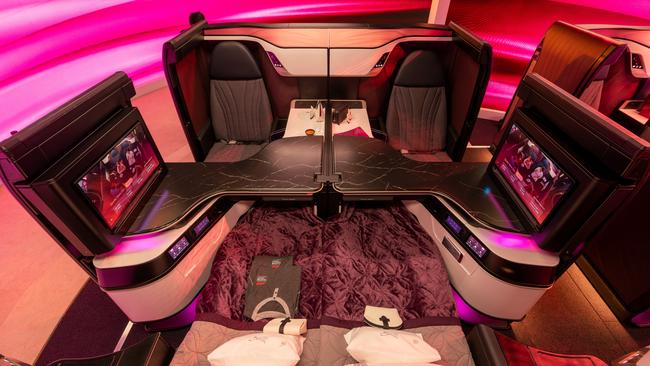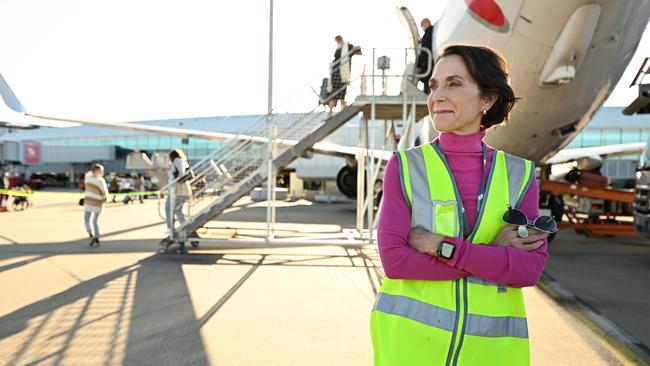Project Doubles: The Qatar deal Virgin Australia believes can help it up the ante against Qantas


“We are just waiting for the government to sign off,” said a Virgin executive late on Friday night.
The Australian understands the deal has been codenamed “Project Doubles,” in reference to outgoing chief executive Jayne Hrdlicka, who chairs Tennis Australia and has a son studying overseas on a tennis scholarship.
For Virgin this would be a blockbuster deal on several fronts. For its customers it will mean greater links to the phenomenal Qatar network, joining Australians to Europe via Doha. It also will help the airline attract staff because it will come with significantly improved international staff travel benefits.
And last but definitely not least, it will give Virgin’s majority-owner Bain Capital a valuation for the airline; it still hopes to sell down its shareholding through a several-times postponed initial public offering of shares.
The sticking point is the Australian government, which last year blocked the Qatari government from increasing flights to Australia, citing a variety of reasons on different occasions, in a ruling that Qatar first heard about from the Australian media.
Many pointed to the close relationship between Prime Minister Anthony Albanese and then CEO of Qantas Alan Joyce. A Senate inquiry explored if there were links between Qantas’s support for the Yes vote on the Indigenous voice to parliament and the government blocking increased access from a fierce high-end competitor to the Flying Kangaroo.
Amid speculation what surfaced was an angry Australian public that had become sick of paying record high airfares and wanted increased competition.
The Australian government had misjudged community expectations.

So it’s not surprising that Qatar and Bain have sought a preliminary green light from the Foreign Investment Review Board before announcing any deal.
Treasurer Jim Chalmers recently announced that the government would attempt to fast-track the takeover processes for foreign companies wishing to invest in Australian companies – with a carve-out requiring state-owned potential acquirers to undertake more detailed investigation.
Qatar Airways, as well as Qantas joint venture partner Emirates, Etihad, Singapore Air and others are state-owned or partially state-owned.
In theory, letting Qatar buy a stake in Virgin will be bad news for Qantas, which dominates the domestic market with its high-end Qantas brand and low-cost Jetstar offshoot.
Virgin is stuck in the middle and currently has very limited international marketability. A Qatar deal should change all that and potentially give the airline funding to push harder on Qantas in the domestic market.
But having a foreign-owned airline on the register didn’t stop Virgin collapsing during the Covid-19 pandemic.
At that point, Virgin had Singapore Airlines, Etihad and Chinese groups HNA and Nanshan, as co-owners, along with a small portion of listed shareholders and Virgin Group, which still held a 10 per cent stake at that time.
And the truth is Qantas has the domestic market tightly wrapped up with its two-brand strategy.
Last week, Qantas announced its second-highest profit on record, and more than half of its profits came from its Qantas and Jetstar domestic offerings.
The airline’s profit fell 18 per cent from the previous blockbuster year but was still $2.1bn. Not bad for an airline, to put it mildly.
Its results were bolstered by its Qantas-branded domestic airline producing underlying earnings before interest and tax of $1,063m on an operating margin of 14.7 per cent, with dramatically improved service levels.
Jetstar Domestic delivered underlying EBIT of $298m on an operating margin of 11 per cent.
Virgin is yet to reveal its full-year results but at its most recent earnings it returned to profitability for the first time in a decade.
Both airlines will benefit from the demise of regional carrier Rex, which moved off its government-subsidised routes to try compete directly with Qantas and Virgin on the lucrative Sydney-Melbourne-Brisbane routes, but failed.
Meanwhile, Virgin is yet to announce its new CEO. At last check the race had narrowed to two, including chief customer and digital officer Paul Jones, a former Qantas executive who was involved in its illegal firing of baggage handlers. He left the airline not long after the management-backed decision was made. Ms Hrdlicka will depart once the new chief is named.



For those in the know inside Virgin Australia, the wait for “Project Doubles” – where top-tier carrier Qatar Airways takes a 19 per cent stake in the nation’s second-biggest airline – is starting to drag on.